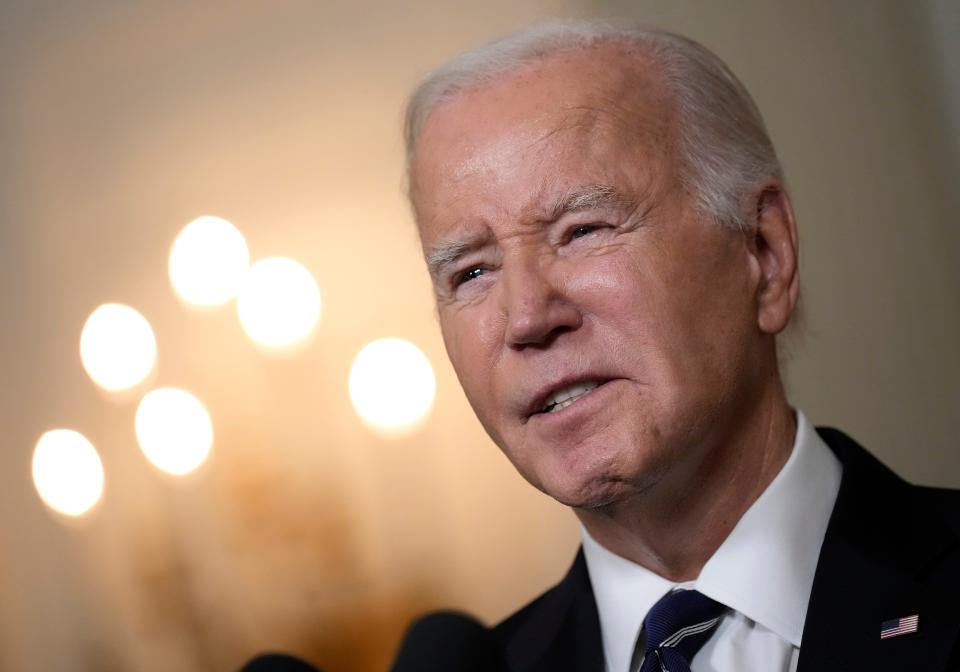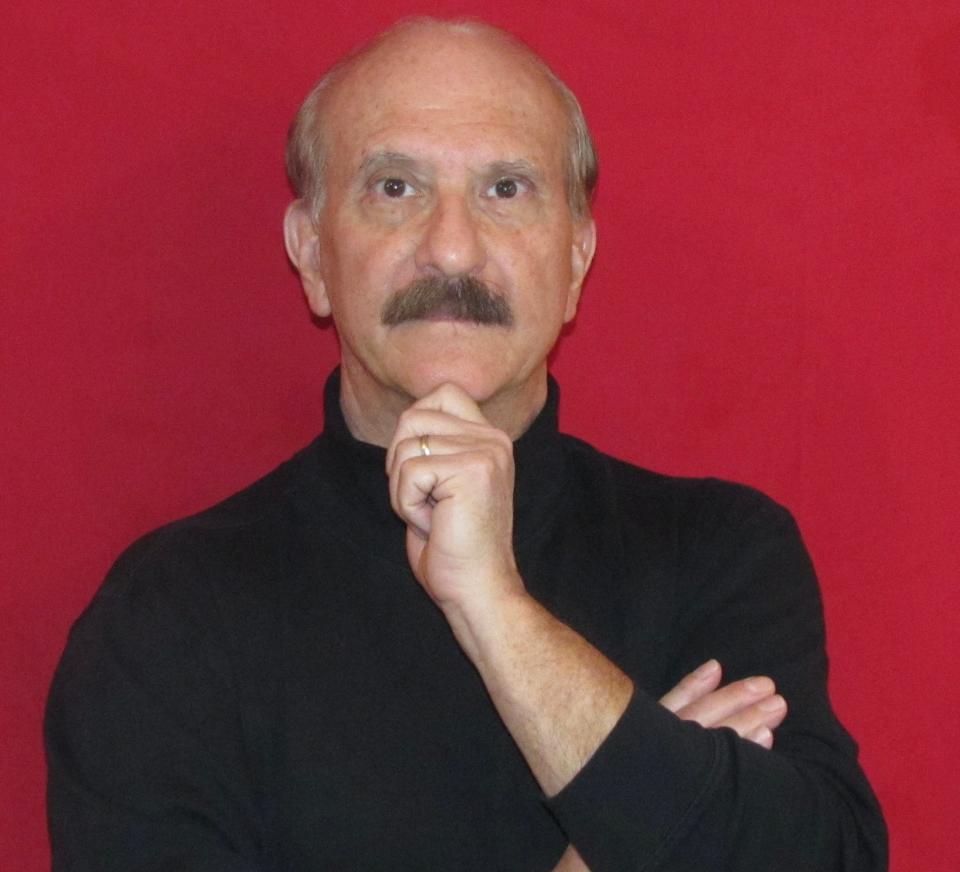Why does government need to more closely regulate social media? We need free speech
- Oops!Something went wrong.Please try again later.
Jay Bhattacharya is a 55-year-old professor of health policy at Stanford University’s School of Medicine. He has four degrees, including an MD and PhD. At the height of the COVID epidemic, he criticized the Biden administration, calling for an end to economic lockdowns and school shutdowns. He concluded those solutions had limited benefit and disproportionately harmed the young and economically disadvantaged.
“The public health establishment in the United States and the world has failed the public,” he said. “The lockdowns harmed our children.” His research indicated that 100 million people worldwide were sent into dire poverty, “near starvation,” by the lockdowns.
“We haven't begun to count the deaths from that yet,” he said, “but it's gonna be in the millions.”
In terms of protecting people from COVID, he adds, “it's becoming clearer they did none of that.” That blasphemy by Bhattacharya — he is called “the man who talked back” — got him into trouble with Biden and the mainstream medical establishment.
He was censored on social media, the classic response of the authoritarian: we know best; no debate needed. To control the narrative, silence your opponents.
And they did. According to a lawsuit making its way to the U.S. Supreme Court, the federal government, in collusion with the social media platforms, Facebook, Twitter, Google, LinkedIn, Instagram, launched one of “the greatest assaults by federal government officials in the nation’s history” against freedom of speech. That’s undoubtedly an exaggeration.
But what’s clear is that in order to go full steam ahead on fighting COVID-19, working closely with Big Pharma, which reaped huge profits, the government had to go after what it labeled “disinformation,” “misinformation” and “malinformation.”
Rise of the 'censorship-industrial complex'

Under the Orwellian guise of halting disfavored speakers, viewpoints of hundreds of social media dissidents were banned, warned, de-monetized and labeled as dangerous. Algorithms were adjusted to de-emphasize the naughty speakers.
“The sad fact is,” says Bhattacharya, “we are living in a time where there is once again a need for scientists to (talk) secretly to one another rather than openly about what they actually believe.”
Don’t get me wrong. Those scientists may be misguided — and wrong.
There is a lot we do not know, like how the virus started, whether the vaccine was the only way out, whether the vaccines were universally needed, or if they are truly safe. We need debate.
But the jury is just beginning to deliberate. We’ve not had a spirited debate. And that’s because, despite a free speech clause in our Constitution, the scientific, medical and social debate has been muted — by government and social media. Some call it the “censorship-industrial complex.” The lawsuit, Biden v. Missouri, seeks to take them both to task, and stop the censorship, if it’s truly that.
A District Court judge has told the Biden administration to stop meddling until a trial takes place to resolve the issue (put on hold by the Supreme Court). A trial will tell us: Is there compelling evidence the Biden administration colluded with and coerced social media to censor dissenters? Did the Biden administration's “jawboning” of the media also come with the implied threat that if you do not cooperate we will sue you for antitrust violations?
“Not all government speech directed at private parties raises constitutional concerns, nor should it,” said Mayze Teitler of the Knight First Amendment Institute. “The government needs to speak — including to private actors — in order to govern.”
In other words, the government can chastise Twitter for allowing speech that might interfere with voting. Or national security. Or medical decision-making by citizens.
“At the same time, the government shouldn’t be able to circumvent First Amendment protections by using informal means to coerce platforms to suppress,” Teitler adds.
Exactly where the threat line begins and jawboning ends isn’t clear.
What is clear: one of the primary reasons America adopted the First Amendment in 1791 was to stop the party in power from insisting that its view was the only acceptable one.
More Rob Miraldi: Can the First Amendment bend to help teens fixated on social media?
Trials and Trump: Georgia trial could be the first televised. We deserve to see the others, too.
What about the First Amendment?
Who are Biden, the surgeon general, the FDA — the powers that be — including media moguls Zuckerberg and Musk, to decide what in the world of science is true and false? Who appointed them Gods?
The only God in democracy is the First Amendment, which insists that people hear all versions of fact and opinion, and then decide for themselves what constitutes truth.
“Counter speech, not censorship, is the proper response to supposed misinformation,” the plaintiffs argue in their lawsuit against Biden. Censorship is unnecessary since truth will counter falsity, which will fall away.
I know this is a naïve free speech cliché. Our information universe is complicated — both dangerous and exhilarating. Facebook has 3 billion users; X, formerly known as Twitter, has 340 million. Approximately 500 million tweets are posted daily and 500 hours of video uploaded to YouTube every minute.
And there truly are lots of wild lies floating around. The Brennan Center for Justice filed a friend-of-the-court brief because “disinformation is a major threat to the fabric of democracy. It can deceive or intimidate voters into not voting, generate violent hostility toward election workers, and undermine trust in election outcomes.”
At election time, they point out, so much misinformation is posted about where and how you can vote that it imperils people’s right to vote, especially in minority communities that are often the target of the false information. In the U.S., malicious actors have repeatedly deployed election falsehoods to deter voters.
The Senate Select Committee on Intelligence found that Russia operated 50,000 social media “troll” accounts in 2016 to influence the election, much of it targeting Black audiences.
And the question is whether we need government to decide which speech is permissible. Does government need to more closely regulate social media? Or do we need to allow the current free-for-all to continue? Should social media platforms even have the same free speech rights that mainstream media do?
America is at a key juncture in how it treats the new information universe that dominates us. Here is what makes me nervous: Too many in government and too many elites think the people are not capable of making up their own minds.
Rep. Jennifer Wexton, a Virginia Democrat, said recently: “Many Americans are ill-equipped to recognize and sift through false, misleading and emotionally manipulative posts.”
And that is troubling because the underpinning of free speech is that the people CAN wade through the morass and CAN be trusted.
The alternative to trusting people is that some central authority be empowered to decide who can speak. Kind of like Biden’s much maligned “Disinformation Governance Board.” Of course, there is a middle ground.
Law professor Clay Calvert wants “lawmakers to craft nuanced internet policies that carefully balance free-speech interests with the alleged harms some speech might inflict.”
Teitler says now is the time for the federal courts “to articulate a principled way of distinguishing legitimate government speech from illegitimate government coercion.”
But both the political left and right want only their road to be the one we use. Donald Trump was the worst president we’ve had on free press and speech; Biden does no better by coercing social media into submission.
As Bhattacharya recalls, “There was this tremendous pressure.” No more. The First Amendment should protect speakers, whether they are right or wrong.
Rob Miraldi’s First Amendment writing has won numerous awards. He taught journalism at the State University of New York for many years. X: @miral98; email: rob.miraldi@gmail.com

This article originally appeared on NorthJersey.com: Free speech: Does the U.S. government need to regulate social media?

